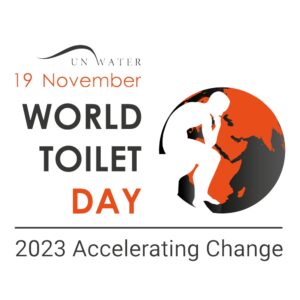Have you ever taken a moment to ponder on the privilege of having access to clean water and sanitation facilities? These amenities, which many of us take for granted, remain a distant luxury for countless individuals across the globe. This stark reality underscores the significance of World Toilet Day, an annual observance held on 19th November. The primary aim of this day is to raise global awareness about the pressing sanitation crisis and the urgent need for clean, safe toilets accessible to all.
In this blog post from Showers to You, we delve deep into the history and purpose of World Toilet Day, a topic that holds great relevance today. According to the United Nations, which officially recognised this observance day in 2013, its objective is to inspire action to address the global sanitation crisis.
The History and Purpose of World Toilet Day
The history of World Toilet Day can be traced back to 19th November 2001 to raise awareness against the ongoing global sanitation crisis. World Toilet Day, celebrated annually on 19th November, is a critical global observance officially recognised by the United Nations since 2013. The primary objective of this day is to draw attention to the pressing global sanitation crisis. This is a significant issue that remains largely overlooked despite its far-reaching implications.
Today, an alarming number of around 3.5 billion people across the globe are still without access to safe sanitation facilities. This constitutes more than half the world’s population, a sobering statistic that underscores the severity of this crisis. Lack of proper sanitation facilities poses severe health risks and infringes on individuals’ dignity and fundamental human rights.
World Toilet Day is a powerful platform to raise awareness about this critical issue and galvanise collective action towards addressing it. The observance of this day is not just about highlighting the problem; it is also about fostering a sense of urgency and commitment towards finding sustainable solutions.
Why Raising Awareness is Important
In 2023, the theme is Accelerating Change. The absence of sanitation facilities is a significant contributor to disease and mortality, predominantly impacting developing nations. Insufficient sanitation amenities coupled with substandard hygiene practices can lead to the spread of infectious diseases such as cholera, diarrhoea, and typhoid fever.
Women and girls are disproportionately affected by this lack of access to sanitation facilities. The need for privacy and safety often compels them to travel long distances in search of a secure place to relieve themselves. This not only exposes them to potential threats and dangers but also places them at an increased risk of attacks and violence.
Taking Action: What We Can Do to Help Tackle the Sanitation Crisis
We all must play an active role in tackling the global sanitation crisis. According to UN Water, there are three key actions that have garnered popularity in the UK for their effectiveness:
Water Conservation – One of the most direct ways to contribute is through water-saving measures. This can include taking shorter showers, promptly repairing leaky faucets or pipes, and installing water-efficient appliances such as low-flow showerheads and toilets. Through these simple yet impactful steps, we can significantly reduce our water consumption and contribute towards a sustainable future. Check out our dedicated blog post on How to save water in the Bathroom for various suggestions.
Prevention of Pollution – Another critical action is to prevent pollution. This includes being mindful of what we flush down the toilet. Non-biodegradable items such as wet wipes or sanitary products can cause significant damage to our water systems. Instead, opt for disposal methods that do not harm our environment. Additionally, using eco-friendly cleaning products can substantially reduce the amount of harmful chemicals that enter our water systems.
 Sustainable Food Choices – Conscious food choices can also make a difference. Opting to consume locally sourced food or food with a lower water footprint helps reduce the demand for water-intensive agriculture. This not only supports local economies but also reduces our overall carbon footprint.
Sustainable Food Choices – Conscious food choices can also make a difference. Opting to consume locally sourced food or food with a lower water footprint helps reduce the demand for water-intensive agriculture. This not only supports local economies but also reduces our overall carbon footprint.
We can all contribute to tackling the global sanitation crisis by adopting these actions. Remember, every small effort counts, and we can make a significant difference together. You can see the United Kingdom’s current Water Action Agenda and future goals.
To Conclude
In summary, World Toilet Day serves as a reminder that access to sanitation facilities should be a fundamental human right, and we must raise awareness of the global sanitation crisis and take steps to tackle it. We can solve the sanitation crisis by implementing simple actions like saving water, stopping pollution, and eating local food. We all have a role to play in ensuring worldwide access to safe and clean toilets, promoting dignity. Remember, your contribution is vital for a world with dignified sanitation facilities for everyone
To learn more about World Toilet Day, please visit the official website for detailed information and fundamental resources.
